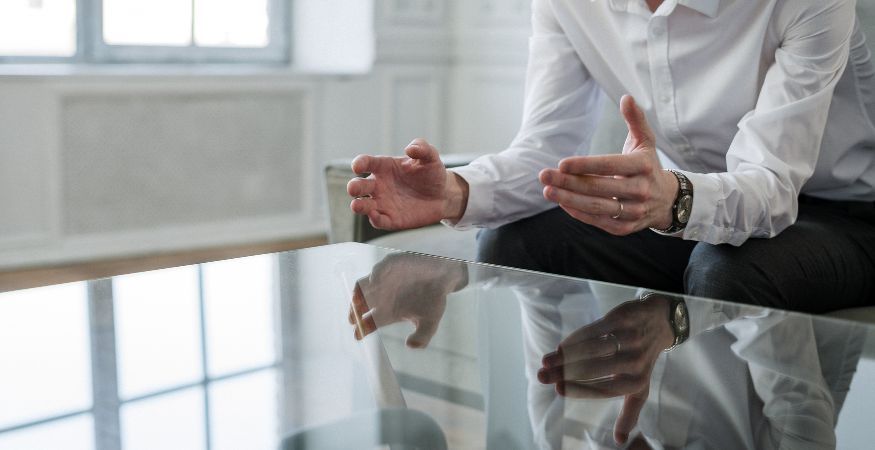Work Order Management in Cemeteries: Best Practices and Benefits
Improve productivity and customer service in cemetery management with an efficient work orders system. Discover the benefits in our latest blog.
Explore the impact of grief support on deathcare professionals and the importance of mental health in the bereavement services industry.

We're eager to discover more about your cemetery and explore the possibilities of integrating PlotBox seamlessly into your operations.
Let's Talk
And within beareavement services, that not only includes those who experience loss and grief, but also those who serve them - our last responders - our friends and colleagues who work within cemetery, crematoria and funeral home organisations across the globe.
At PlotBox we’re fortunate to have people amongst our numbers who have worked for many years within bereavement services. One such person is Solutions Consultant Marc Lamb, who in a previous role was General Manager of a large Memorial Park.
To recognise World Mental Health Day, Marc provided us with his first-hand experience of dealing with grief support, the impact on bereavement services professionals and how they can support their own mental health and wellbeing.
As a general manager, I was an operations manager of sorts - I had a group of people that I led. One of the things, however, that I did above and beyond my role, was working with families all the time, several times a week.
I would be there for families, developing a relationship with them, making sure to see [the process] through, supporting them with anything that they needed within the cemetery, and in the organisation of the funeral itself.
The most important thing for me was to be standing waiting for families on the day of the funeral, guiding them through the whole process from the second they entered the property.
I would lead the entire procession whether it was 5 cars or 200 cars, standing with the family, often at a respectful distance, to give them their privacy; but my presence was known deliberately so that they always felt safe, cared for, and attended to in the knowledge that someone was there to make sure everything went as it should.
To that point, I'll share a quick story…
I had been at the park for just a couple of months when a woman who had lost her son came to us. The funeral wasn’t large by any means, but on the day, I made sure that I stayed with her and the family the whole time, recognising that they didn’t want me to leave because it made them feel secure.
One of the things I did, and I made it a point to do every single time from that day moving forward, was once the services were over, and as the family would leave, I would stand next to the casket, so they never had an image of the casket being left alone.
And I remember the mom as she drove away, she stopped her car and she said to me, “I wouldn't be able to leave here if I didn't see you standing there.”
And what I didn’t know at the time until she pointed it out, was the impact I was having - and in that moment it all just clicked. It just made sense - it's all about being there for the families.
One of the most important things that I would do every day was to be vulnerable, to be the last person a family sees when they come in and go through a process like that.
Stoicism is good. I use that every day. You know that you have to get things done to a certain degree, but vulnerability is just as good as stoicism in my belief, and knowing when to use it.
There were moments where [family members] would be in tears, and moments, I don’t mind admitting, when I would also have tears, because ultimately I'm human too, and I showed that.
For the families and for me, that was the most important thing, because it helped to provide trust. If I can be vulnerable in front of you, then you can now trust me. If I can't be vulnerable around you, it's going be hard for you to trust me. So I would always do that and while it became easier, it was emotionally tolling as well.
There were days when it was hard.
We had staff who would take the same approach as me, and there were days, in their lowest moments, that it was hard on them.
I think all cemetery organisations need to remind themselves that everyone is part of the same thing.
Whether you're in the back office taking appointments or dealing more closely with families - what you’re dealing with is sensitive and you have to be sensitive towards it.
You know, one of the things I was always afraid about was, “Will I ever become numb to this?”, and I never did.
I’ve been asked the question - is it easier to deal with the passing of a friend or loved one and my answer has always been, “No, absolutely not.” In fact, it's almost harder because I feel the gravity of it, and I know other deathcare professionals do so as well. I know who this impacts. I know how this affects people, so when it was a personal death in my family, or a friend, I would almost take it harder, because I was more sensitive to it.

I think that's something that is absolutely growing and there's a massive need for it. I think it’s two-fold:
One - the larger organisations that have the ability to offer this service, they do, and I think they've identified that this is a growing need in today's world, and two - there are people that for various reasons may be unwilling to seek out aftercare - with a therapist, for example.
Perhaps they're too proud, or it's not something they would do within their family. I've had many conversations with people - mostly men between the ages of 65 and 85, in my office, who wouldn't go to a therapist or seek aftercare.
Yet they would talk to me as if, in a way, I was their therapist. So the need for it is there.
The risk is burnout. The risk is that you’re going to lose a lot of good people to staff attrition.
The concern is that good people step up and rise to the occasion, right? They step up and they do the job that needs to be done, and they do it in a stoic manner. They might pretend, or give the illusion that they can do it all, but behind those eyes, that person is feeling it.
I had been in that position before and then one day it hits.
I remember walking out of the office one morning. There was just too much death. That week was a really busy week. There were so many emotions and every time I turned a corner, there was death, and I was also dealing with death in my personal life.
I felt like I had cracked and needed to step away.
And that means providing a safe, supportive environment for that to occur. Years ago, I don't think that really existed. There was the expectation to do your job, and that if you're having a hard time, perhaps you need to find something else.
But that's not human - to do this every day…to not feel anything.
Thankfully, I think there are steps being made where that is now being recognised and accounted for.
I think support should be available to those who are in this industry at all times.
And what's really important to individuals is who that support is coming from: Are they trained? Do they know what you are going through? Have they had similar experiences?
When I was going through a really hard time, I didn't want to talk to anybody at work, I wanted to talk to somebody outside of work.
I went to one of my best friends who regularly experiences challenging circumstances through his line of work. I drove right to his house and I just blurted everything out. I asked him how he dealt with it and he said, “Honestly, I don't know. You just do it and you fall apart, and the next day you shake it off, you say why did I get so upset about that and you go back to work.”
Of course, I know that will make sense to many people, and no sense to many others.
Perhaps, if I’d had an outlet along the way, just to let a little steam off, it would have helped. Because it builds. And there's no valve to release anything. So you explode, or you cave in.
You know, I do think there is still a certain stigma around mental health.
It's interesting, people sometimes say, mental health is fine to talk about unless it's your own mental health, right?
For example, if you were having struggles, I would listen to and share with you. I would be there for you without judgment - yet when it comes to my own mental health, that's for me [to deal with].
One of the things all of this has taught me is to be open, and to be ‘meta’ for a moment, that’s what I’m doing right now - I’m being vulnerable by sharing with you right in this moment.
If we were talking in a forum like this and I start to notice guards being lowered, it allows me to be vulnerable. Next thing I know, I'm in a therapy session that’s not a therapy session - I'm just having an exchange.
The formality of it is what perhaps makes some of us think twice [about seeking help], although I'm of course fully supportive of therapists, counsellors and psychiatrists.
Aside from that, it may be in the admission that something is wrong. That self admission can be hard - that fear of judgment, of showing vulnerability, or the concern that if I share something, later on, whether 6 months or a year, my actions may be judged against that.
And that’s where trust becomes important.
At times we would sit in my office and have a conversation, just as we’re having now.
We’d have off the record conversation and they would share what was going on. It would be my job to make them feel comfortable, and I would treat it the same way I would treat a grieving family - that is, I would lower my guard - letting them know that it was OK, and what they were sharing was normal.
Not counselling in any formal way, of course, I’m not qualified for that, but the creation of a ‘safe space’ in which we could have an open exchange of experiences.

That’s an interesting one. I’m very aware of how there can be triggers for staff when providing support to bereaved families.
I knew, for example, that if a staff member’s own experience closely mirrored that of a family they were supporting, it would hit them harder than normal.
From my own experience, on one occasion I supported a father who came in with his two sons after having suddenly lost his wife...that one hit me hard because I could relate so closely and I saw my father in this man, and my brother and I in his two sons.
I believe that those feelings can remain dormant and return when experiencing a similar situation, so
In terms of specific signals in colleagues, I might have seen people becoming ‘short’, terse or abrupt - taking that emotional toll and channeling it outwards.
On seeing that, I would ask them if they wanted to talk, and when talking to them, they would more often than not open up and tell me that something wasn’t quite right.
It doesn't let up. Today I'm going to bury someone. Tomorrow I'm going to bury three people…and the next day I'm going to bury three more…the next day, perhaps one more, and it will never stop.
And that's the weight of it - it can be overwhelming.
You're not alone. Let it out. Don't bottle it up. Talk to someone.
Find someone you trust and you can share this with and let it out. Be vulnerable. Find somebody you can trust. You're not alone. It's okay.
It's normal to feel affected by what you do.
The service they’re providing…how incredible. I would always say it's an honor and a privilege to be the person to support families in finding someone’s final resting spot in perpetuity.
That's incredible. That person lived a life and now they have a resting place - and you did that.
Improve productivity and customer service in cemetery management with an efficient work orders system. Discover the benefits in our latest blog.
Explore the transformative impact of Covid on the deathcare industry, emphasising the vital role of technology adoption and evolving consumer...
Learn how a CRM system can help cemetery management software gain and retain families, improve efficiency and enhance staff productivity.
Be the first to know about our new resources and blogs